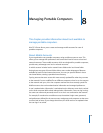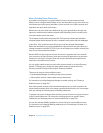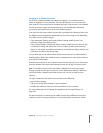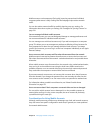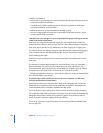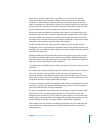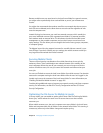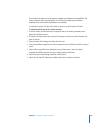
Chapter 8 Managing Portable Computers 139
Mobile accounts can’t restore deleted files through syncing
Although mobile accounts keep user files stored in two locations—in local and
network home folders—they do not eliminate the need for a formal backup system.
When you configure the user’s portable home directory, you choose a subset of their
folders to sync. This syncing affects files that are new, modified, or deleted since the last
sync.
If users save files in locations that are not synced, the files remain local. If users delete
files and then sync, those files are removed from local and network home folders.
Unlike some formal backup solutions, users can’t retrieve older versions of files, such as
versions saved prior to the last sync.
You can’t create mobile accounts when connected to a network through a virtual
private network (VPN) connection
You must create mobile accounts while being directly connected to the network. After
enabling a mobile account, you can then use VPN to connect to the network and sync
your mobile account.
Strategies for Syncing Content
Administrators can enable and configure syncing through Workgroup Manager, and
users can configure syncing through Accounts preferences. Each method of creating
mobile accounts has different sync capabilities:
 When you create mobile accounts through Workgroup Manager, you can sync any
folder in the user’s home folder.
 When a user creates a mobile account through the Accounts System Preferences, he
or she can only sync top-level folders like ~/Desktop or ~/Documents.
A background sync occurs at a frequency set by you, or when the user manually syncs.
By default, when you enable background syncing, it occurs every 20 minutes.
If a file in one home folder has been modified and the file in the other home folder has
not, the newer file overwrites the older file. If both files have been modified since the
last sync, the user is prompted to choose which file to keep.
Do not use background syncing with folders containing files accessed by multiple
computers. There are several scenarios where this could cause users to load older,
unsynced files:
 The user saves a file on one computer and loads the same file on another computer.
If that file was not synced to the server since its last save, the user loads an outdated
version of the file located on the server.
 The file might not exist on the server because it was not synced. If the file was not
synced from the server before loading, the user either does not see the file or loads
an outdated local version.



